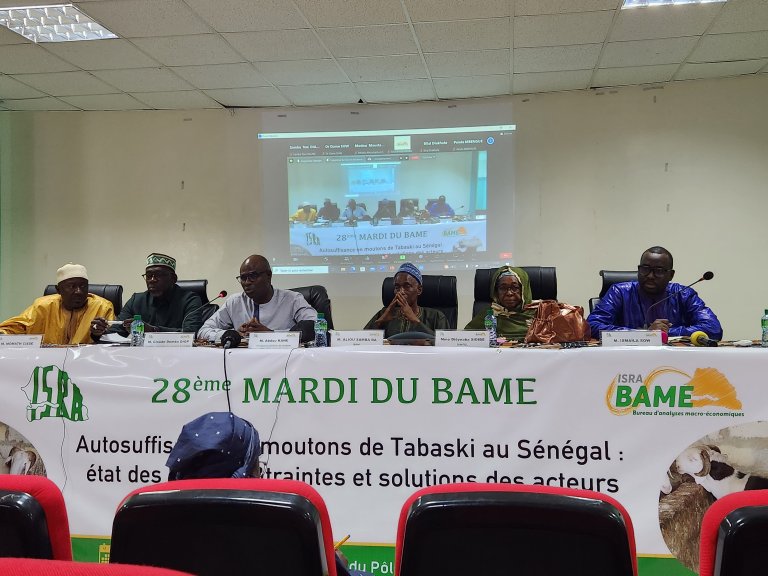Senegalese initiative supported by PRCI improves sheep sector
ISRA-BAME, a PRCI Center for Policy Leadership, takes the lead on policy outreach in the sheep sector in Senegal
The recent “Mardi du BAME” "Tuesday of BAME " in English, organized by the Bureau of Macroeconomic Analysis of the Senegalese Agricultural Research Institute (ISRA-BAME) supported by the Innovation Lab for the Capacity and Influence of Food Security Policy Research (PRCI), achieved notable success in addressing the issue of self-sufficiency of Tabaski sheep in Senegal. The event, held on June 13 in Dakar, Senegal, brought together experts from various sectors involved in the supply of Tabaski sheep. In-depth discussions centered around animal health, livestock feed, organization of the livestock sector, financing, and supervision of livestock activities. The insights and recommendations derived from the conference will be compiled into a policy note that will be sent to the government to guide future decision-making in the sector.

The recommendations proposed during the event are aimed at improving the Tabaski sheep sector in Senegal comprehensively. Key areas for improvement include enhancing the local breed, investing in high-quality animal feed production, and implementing effective livestock disease control measures. Additionally, promoting entrepreneurial involvement, particularly among young people, and engaging women in livestock vaccination programs were highlighted as crucial steps toward achieving self-sufficiency in sheep. Synergy between different actors and ministries, preserving pasture areas, and increasing productivity through improved feeding practices and genetic enhancement were among the proposed strategies to bolster the livestock sector.
Tabaski, also known as Eid-Al-Adha, is a significant Muslim holiday celebrated in the Republic of Senegal in West Africa. It is the Wolof expression for Eid-Al-Adha, which is the second-largest Muslim holiday worldwide. It is one of the most important occasions and is celebrated with great fervor in Senegal. During Tabaski, sheep are ritually butchered, and the meat is divided into three equal portions, following the customary practice of Eid-Al-Adha celebrations. One-third of the meat is retained by the household that performed the sacrifice, one-third is prepared as a feast, and the final third is generously distributed to neighbors and those in need who cannot afford a sheep. This act of sharing and giving reflects the spirit of unity, compassion, and community solidarity that lies at the heart of the Tabaski celebration in Senegal.
The majority of the population of Senegal are Muslim, which creates a huge national demand for sheep at reasonable prices during Tabaski. Currently, authorities must resort to importing sheep from the neighboring countries of Mali and Mauritania. This conference organized by ISRA-BAME is a move towards self-sufficiency in Tabaski sheep for the country.
PRCI supports three Centers for Policy Leadership, and employs a competitive selection process to identify and nurture Centers for Policy Leadership (CPLs) – agricultural policy research centers located in Senegal, Uganda, and Nigeria. These CPLs are seamlessly integrated into PRCI's framework, benefiting from a rigorous self-assessment process aimed at identifying strengths and weaknesses within their respective policy ecosystems. Following this assessment, PRCI empowers each CPL to design its tailored capacity development plan and provides direct financial support to facilitate the execution of these plans. Through this collaborative and empowering model, PRCI aims to drive meaningful change in food security policy landscapes and establish these CPLs as influential forces in shaping effective policies for sustainable food security.
The "Tuesday of BAME" initiative is launched in 2004 and it focuses on scientific approaches from food security challenges that has once again demonstrated their importance in fostering collaboration and generating practical solutions. ISRA-BAME's commitment to such efforts, supported by the PRCI, bodes well for the future of agriculture and livestock in Senegal. The success of this recent conference will undoubtedly contribute to the sustainable growth and development of the Tabaski sheep sector, benefiting both producers and the broader community.
"Thanks to the support of the PRCI, ISRA BAME communicates more about its achievements. This allows us to position ourselves with decision-makers and to bring the results of our research to the highest level." said the Director of BAME, Mrs. Astou Diao Camara.



 Print
Print Email
Email




